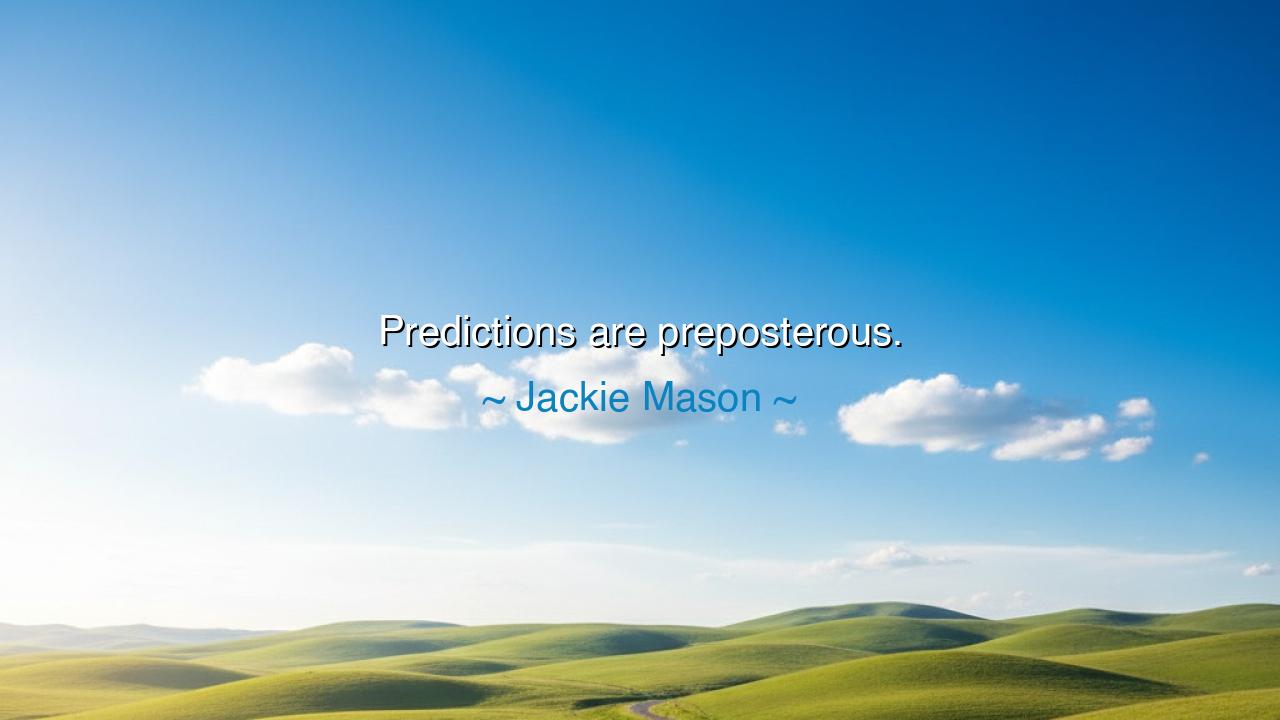
Predictions are preposterous.






In a world dominated by the pursuit of knowledge and understanding, there are those who, with great wisdom, recognize the limits of human foresight. Jackie Mason, the legendary comedian, distills this truth in a brief yet profound statement: “Predictions are preposterous.” With this, he boldly challenges the human tendency to think that we can know or control the future. In the ancient world, this same understanding was embedded in the wisdom of the oracle, who was often cryptic and elusive in their prophecies, reminding those who sought answers that the future, like the wind, is ever-changing and beyond our grasp.
The ancient Greeks, in particular, held an understanding of fate and uncertainty that mirrors Mason’s words. The Stoics, such as Epictetus and Marcus Aurelius, taught that while we may influence our actions, we have little control over the events that unfold in the world. Epictetus famously stated, “We cannot choose our external circumstances, but we can always choose how we respond to them.” The Stoics understood that attempting to predict the future was an exercise in hubris—the human folly of assuming we could see and control what is yet to come. Mason’s statement echoes this ancient belief: predictions, no matter how confident, are ultimately preposterous because they fail to acknowledge the vastness of the unknown.
In the story of Cassandra, the Trojan prophetess from Greek mythology, we see the tragic consequences of believing too firmly in predictions. Cassandra was cursed to foresee the future with perfect accuracy but was doomed never to be believed. She predicted the fall of Troy, but the powerful and proud leaders of her time dismissed her warnings, thinking they knew better, that their own predictions were the truth. In this way, Cassandra’s tragedy reflects the preposterous nature of predictions—they are often bound by human pride, limited by our own egos, and ignore the unpredictability of fate. This ancient myth serves as a timeless reminder that certainty in the future is often an illusion.
Consider, too, the example of the Oracle at Delphi, who, despite her revered status, often gave answers in riddles and paradoxes. Those who sought her wisdom did so knowing that her words were meant to inspire reflection and self-awareness, not to predict the future with absolute certainty. The ancient world recognized that, like the river, the future flows and bends in ways we cannot always foresee. The Oracle’s cryptic nature was a humble reminder that the future is not something to be known or controlled but to be navigated with wisdom, courage, and adaptability. In this, we see that Mason’s quip about predictions carries a deeper truth: certainty about the future can blind us to the need for personal growth and preparedness in the present.
Predictions, whether about the future of empires, the fate of nations, or the course of personal lives, are often based on the limited understanding of the moment. History is filled with examples of confident predictions that proved wildly inaccurate. Nostradamus, the famed 16th-century seer, predicted the rise and fall of kings, yet many of his prophecies remain shrouded in mystery and interpretation. Sir John Harington, a 16th-century poet, once predicted that the “steam-powered ships” would one day make “all things possible” for mankind, yet he, like many others, misunderstood the forces of innovation and change that would shape the world. These examples reflect the preposterousness of predicting the future—because the future is not a fixed, unchangeable path, but a shifting landscape shaped by the decisions, actions, and unknown variables of countless individuals.
The true lesson in Mason’s words lies in the humility required when we contemplate the future. It is not that we should abandon all foresight or preparation, but that we must approach the future with a deep awareness of its uncertainty. Rather than make bold predictions that inevitably fall short, we should focus on shaping the future through intentional action. The Stoics once again offer us wisdom here: we cannot control what happens, but we can control how we respond. The future, while unknown, is malleable to our actions in the present.
In our own lives, we must learn to embrace the unknown and uncertain nature of the future with grace. We should avoid the trap of prediction—whether it be for our careers, relationships, or the course of history—and instead, focus on living in the present with clarity and purpose. Mason’s words invite us to relinquish the illusion of control over the future and embrace the freedom that comes with accepting its uncertainty. The lesson is one of humility: let us not be fooled by the preposterousness of predictions, but instead, be active participants in shaping our future through the wisdom, courage, and adaptability that come from embracing the present moment with both wisdom and humility.






AAdministratorAdministrator
Welcome, honored guests. Please leave a comment, we will respond soon